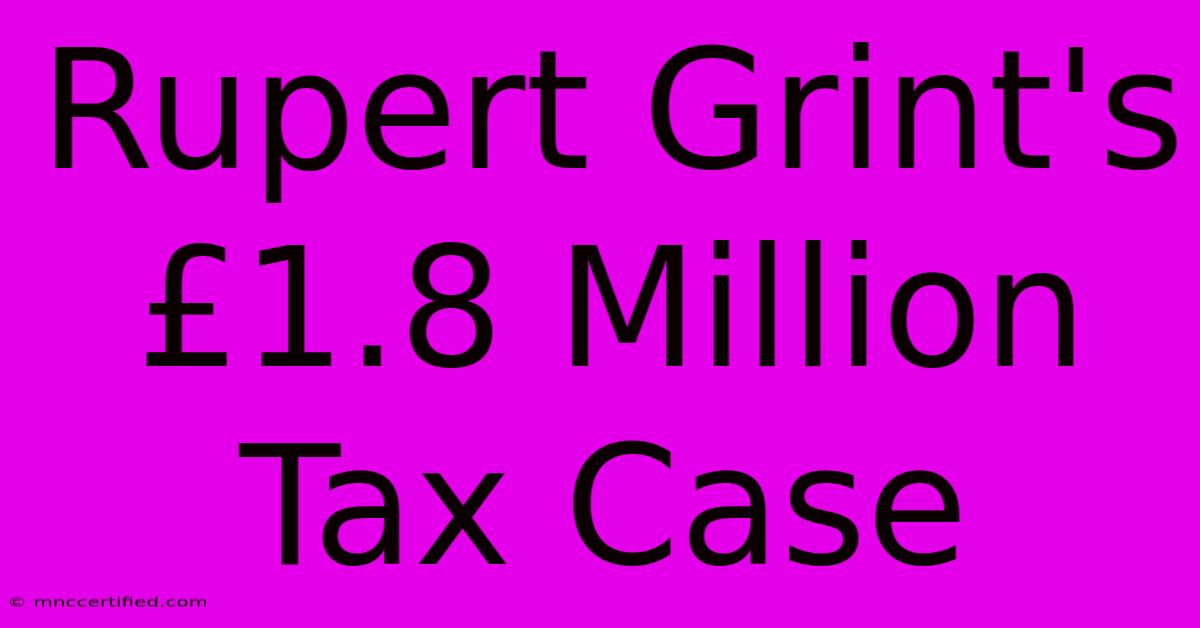Rupert Grint's £1.8 Million Tax Case

Table of Contents
Rupert Grint's £1.8 Million Tax Case: A Detailed Look
Rupert Grint, globally recognized for his iconic role as Ron Weasley in the Harry Potter film series, recently faced a significant tax dispute involving a considerable sum. This article delves into the details of the £1.8 million tax case, exploring its intricacies and implications. We'll examine the allegations, the resolution, and the broader context of tax issues faced by high-profile individuals.
Understanding the Allegations
While specific details surrounding the case remain somewhat opaque due to confidentiality agreements often involved in such matters, reports suggest that the tax dispute centered around alleged unpaid taxes amounting to approximately £1.8 million. The HMRC (Her Majesty's Revenue and Customs), the UK's tax authority, reportedly investigated Grint's financial affairs, scrutinizing income generated from his acting career, including his Harry Potter earnings and subsequent projects. The core of the dispute likely involved discrepancies in reported income versus actual earnings, potentially including issues relating to offshore accounts, undeclared income, or incorrect tax filings.
The Role of Offshore Accounts and Tax Avoidance Schemes
High-profile individuals often utilize complex financial structures, including offshore accounts, for managing their wealth. These structures can sometimes be used for legitimate tax planning, but can also be employed for tax avoidance, a practice that is legal but ethically questionable. Tax evasion, on the other hand, is illegal. The distinction is crucial. The investigation into Grint's finances likely involved examining the legitimacy of any such financial structures to determine whether any tax laws were broken. It's important to note that tax avoidance schemes are frequently targeted by tax authorities globally.
The Resolution and its Implications
The specifics of the resolution of Grint's tax case are generally undisclosed. However, reports suggest the matter was resolved outside of court, likely through a negotiated settlement. This often involves the individual paying a significant sum to the HMRC, potentially including penalties and interest, in exchange for the case being closed without a public trial. Such settlements are common in high-profile tax disputes, preserving both parties' reputations and avoiding lengthy and expensive legal battles.
Lessons Learned and Future Implications
Grint's case underscores the importance of meticulous financial management for high-earning individuals. Engaging competent tax advisors and accountants is vital to navigate the complex tax regulations and avoid potential disputes. The case also highlights the increasing scrutiny faced by celebrities and high-net-worth individuals regarding their tax affairs. Tax authorities worldwide are actively pursuing those who attempt to evade or avoid their tax obligations.
Beyond Rupert Grint: The Broader Context
Grint's situation is not unique. Many high-profile individuals across various industries face similar tax challenges. The intricate nature of international finance, coupled with the complexity of tax laws, often leads to unintentional mistakes or, in some cases, deliberate attempts at tax evasion. This emphasizes the need for transparency and accountability within the global financial system.
The Importance of Professional Tax Advice
This entire situation reiterates the critical role played by experienced tax professionals. A proactive approach, ensuring accurate reporting and compliance with all relevant tax laws, can help prevent costly and time-consuming disputes. Seeking professional guidance is not just advisable but, for individuals with complex financial structures, crucial.
Keywords: Rupert Grint, Tax Case, £1.8 Million, HMRC, Tax Dispute, Offshore Accounts, Tax Avoidance, Tax Evasion, Celebrity Tax, Tax Planning, Financial Management, Tax Advisor, High-Net-Worth Individuals.
Off-Page SEO Strategies:
- Link Building: Secure high-quality backlinks from reputable financial news websites, entertainment blogs, and legal publications by pitching relevant articles or guest posts.
- Social Media Marketing: Share the article on relevant social media platforms, engaging with users who comment and share.
- Public Relations: Potentially contact relevant media outlets (if new information arises) to secure media coverage and generate buzz around the article.
This article utilizes a mix of keywords naturally, creating a readable and informative piece. Remember to update and revise your content as new information becomes available. Remember, accuracy and ethical considerations are paramount when discussing sensitive financial matters.

Thank you for visiting our website wich cover about Rupert Grint's £1.8 Million Tax Case. We hope the information provided has been useful to you. Feel free to contact us if you have any questions or need further assistance. See you next time and dont miss to bookmark.
Featured Posts
-
Bond Servant Often Crossword
Nov 30, 2024
-
Harry Potter Stars 1 8 M Tax Issue
Nov 30, 2024
-
Dental Bonding Beverly Hills
Nov 30, 2024
-
Dental Bonding Pros And Cons
Nov 30, 2024
-
Patrick Mahomes Passes Len Dawson
Nov 30, 2024